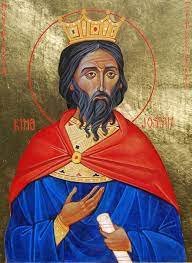The Great King Josiah
I continue to find extraordinary things to ponder when I read the Bible. Just the other day I reread the account of the good king Josiah and his sweeping reforms (2 Kings 21 – 23). What a spectacular reformation that was! No doubt because his reign began when he was only eight years old, it was begun at an age of the innocence of his childhood, that is, of unfamiliarity with the wickedness of his father Amon. Amon’s wickedness, by contrast, was a continuation of the wickedness of his father Manasseh, whose reputation in Holy Writ is that in his abominations he has done “wickedly above all that the Amorites did, with were before him,” and that he “made Judah also to sin with his idols,” Including the shedding of innocent blood, most especially the blood of his own children in sacrifice to his idols. Like father, like son: Amon was just as bad. But not Josiah; he was profoundly different. He had not been with his father long enough to learn from him the perverse ways of wickedness. Here we note in passing the profound responsibility fathers have in setting an example for their children.
Josiah was determined to do what was right. In his eighteenth year he began to enact some transformational changes. Whether that was when he was 18 years old or when he was king for 18 years is unclear; since his reign in total was 31 years, I’m guessing these reforms began earlier rather than later. His biblical legacy is that there was no king before or after him that turned to the Lord like he did, with all his heart, soul, and might (2 Kings 23:25).
So he ordered the high priest and company to begin needed repairs and cleansing of the temple, and these repairs were to be thorough. And it happened that in the process of cleaning things out, Hilkiah the high priest found the book of the law in the house of the Lord, and brought it to the king. And Josiah was overwhelmed at this discovery and rent his clothes, and became convinced that the wickedness of the people the wrath of God had been kindled against them, “because our fathers have not hearkened unto the words of this book” (2 Kings 22:13). And he sent the high priest to inquire about this among the people, who did so, until he found Huldah the prophetess who came with the Lord’s reply. Perhaps an indication of how badly the people had turned is in this rare instance a prophetess, a female, being used to give the Lord’s reply. And the reply from the Lord was one of mercy toward Josiah “because thine heart was tender, and thou hast humbled thyself before the LORD . . . and hast rent thy clothes” (2 Kings 22:19).
And so it was that Josiah in this humility ordered the utter destruction of all idolatrous altars, and high places, and groves, and the killing of the priests of Baal. He even exhumed the bodies of idolatrous priests and burned them to ashes (We note in passing how burial is clearly respect for the dead and cremation is not!).
And then followed a great Passover, that was greater than any Passover prior in all the history of Israel (2 Kings 23:22).
All these great reforms happened due to the humble, honest, faithful determination of one young King Josiah, a great example for faith to follow. And in this too, he took no credit for any of it, but instead owned the wickedness reputation he had inherited by rending his clothes.
And why not be humble? For even our Lord Jesus followed this pattern of humility, for He was after all the Son of Josiah, and in a more profound way owned the wicked reputation of all mankind that He inherited, and also more profoundly than in the case of Josiah had His garments torn from Him, and was crucified.
We may also compare the fact that Josiah’s faithfulness was recognizable early in his life, as was Jesus’ faithfulness: recall how the doctors of the law were so impressed with him in the temple at age twelve. And as Josiah barely knew his father, Jesus who is greater, knew no earthly father at all, being virgin-born. And as faith in Israel was rare in Josiah’s day, so also in Jesus’ day: He once declared that He had not seen faith like that of the centurion in all Israel (Matthew 8:10). And as the writer declares that Josiah’s heart was toward the Lord, so Jesus, who is greater, hears a declaration from heaven that God is well pleased with Him.
And He also, in a greater way than Josiah, had a great Passover, namely the greatest of all, by the institution of the Blessed Sacrament.
And in a greater way than the people benefitted from Josiah’s great reforms, the Church of all history benefits eternally from the great deeds of our Lord Jesus Christ and His resurrection from the dead.
So in many ways Josiah, whose reign was late in the history of the kings of Israel, was a final and clear harbinger of the coming of the King of kings and His eternal kingdom. For a greater than Josiah is here.


